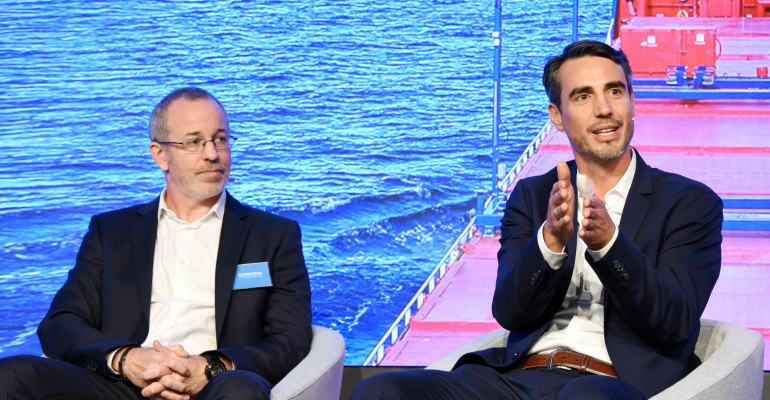Panellists at the global maritime environment congress (gmec) at SMM 2022 had differing opinions on how trust is built between companies, from having “skin in the game” to transparency, to the sheer scale of the challenges ahead.
David Connolly, Chief Technologist at Silverstream Technologies spoke from his company’s experience working installing their air lubrication technology at yards in Korea, yards which offer their own air lubrication systems.
“It's difficult journey. but a large chunk of the world's ships are built by Korean yards, and if you want to be a player in that market, you have to learn to work with them. It's important to remove the adversarial, and come to a more collaborative approach,” said Connolly.
“To me is it is very much about transparency, but it’s also about making sure that all parties have skin in the game, and by skin in the game I mean that they have to achieve something and their neck is on the block if they don't,” said Connolly.
Collaboration also needs to be central to an organisation’s ethos and approach to business, said Connolly, with no real benefit in dealing with a small offshoot granted a narrow remit by the larger company.
Chakib Abi Saab, Lloyd's Register, Chief Technology & Innovation Office said class has a key role to play in fostering collaboration, both through its connections with shipowners and technology provides, and its ability to de-risk investments for financiers.
“We're able to demonstrate whether or not these technologies will have a differentiation and therefore, financial organizations will have a much higher chance to get a return on their investment because investing in technology is risky. De-risking is the key and we trying to provide that de-risking to accelerate progress,” said Saab.
Octavi Sadó Garriga, Ship Design Manager at the Mærsk Mc-Kinney Møller Center for Zero Carbon Shipping saw the impact of the scale of the decarbonisation on decision making.
“What you see is that we we’re finding a common pain point and the common pain point is decarbonization of the industry. I think hopefully, this is going to start triggering a mindset and a cultural change in our industry,” said Garriga.
Already there have been changes in the motivations of first movers taking new technologies, said Garriga, from a purely cost driven decision to one taking more consideration of environmental pollution.
“I think this is where climate leadership is going to come in. We're seeing it in energy efficiency, and hopefully we'll also see it in the adoption of new fuels and conversion of the vessels, and not just looking at cost consideration,” said Garriga.
From a finance perspective, Sebastian Blum Team Head, Maritime Industries Western Europe, Americas and Asia, KfW IPEX-Bank said the bank already had a great deal of experience in collaborating on green shipbuilding projects.
From its own engineers to German government advisors, KfW brings the right people to the table to fully understand the entire project. Blum said KfW also wants to fully understand a partner’s overall ESG approach and its approach to energy efficiency. Even if a project isn’t the cheapest version they can finance, green credentials are a consideration in the bank’s investment decisions.
Copyright © 2024. All rights reserved. Seatrade, a trading name of Informa Markets (UK) Limited.
Add Seatrade Maritime News to your Google News feed.  |

